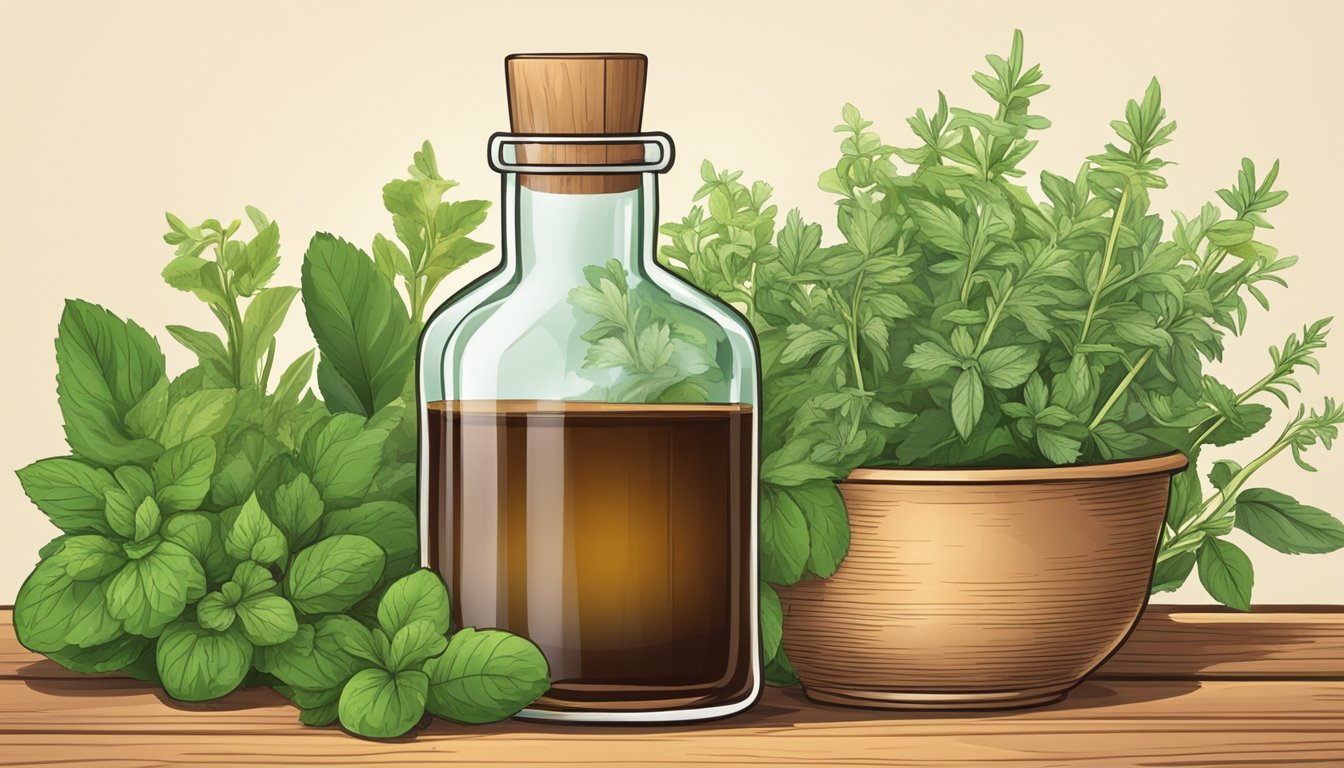Herbal cough syrup is a natural remedy for coughs, used for centuries. Unlike conventional cough syrups, which often contain synthetic ingredients, herbal cough syrups are made from natural ingredients like herbs, honey, and plant extracts. These ingredients work together to soothe the throat, reduce inflammation, and promote healing.
One of the benefits of using herbal cough syrup is that it is safe and effective for people of all ages. Unlike conventional cough syrups, which can cause side effects such as drowsiness, dizziness, and nausea, herbal cough syrups are generally well-tolerated and do not cause any adverse effects. Additionally, many herbal cough syrups are available over-the-counter, making them easily accessible and affordable.
There are many different types of herbs that can be used in herbal cough syrups, each with its unique properties and benefits. Some of the most common herbs used in herbal cough syrups include ginger, licorice root, marshmallow root, and thyme. These herbs work together to provide a range of benefits, including reducing inflammation, soothing the throat, and promoting healing.
Understanding a Dry Cough
As someone who has experienced a dry cough, I understand the discomfort and frustration that comes with it. In this section, I will explain the causes and symptoms of a dry cough, as well as conventional treatments.
Causes and Symptoms
A dry cough is a type of cough that does not produce mucus or phlegm. It is often caused by an irritation in the respiratory tract, such as a sore throat or inflammation. Dry coughs can also be caused by respiratory infections, such as the flu or bronchitis.
Common symptoms of a dry cough include a scratchy throat, coughing fits, and difficulty breathing. Unlike a wet cough, which produces mucus, a dry cough can be persistent and painful.
Conventional Treatment
Conventional treatment for a dry cough often involves the use of over-the-counter cough suppressants. These medications work by blocking the cough reflex, which can provide temporary relief. However, cough suppressants do not address the underlying cause of the cough.
Another option is to use an expectorant, which helps to thin and loosen mucus in the respiratory tract. This can make it easier to cough up phlegm and relieve congestion.
Antimicrobial medications may also be prescribed if the dry cough is caused by a bacterial or viral infection. These medications work by killing or slowing the growth of the microorganisms responsible for the infection.
It is also important to support the immune system by getting enough rest, staying hydrated, and eating a healthy diet. This can help the body fight off infections and reduce inflammation in the respiratory tract.
In the next section, I will discuss how herbal cough syrup can be a natural and effective alternative to conventional treatments for a dry cough.
Natural Alternatives
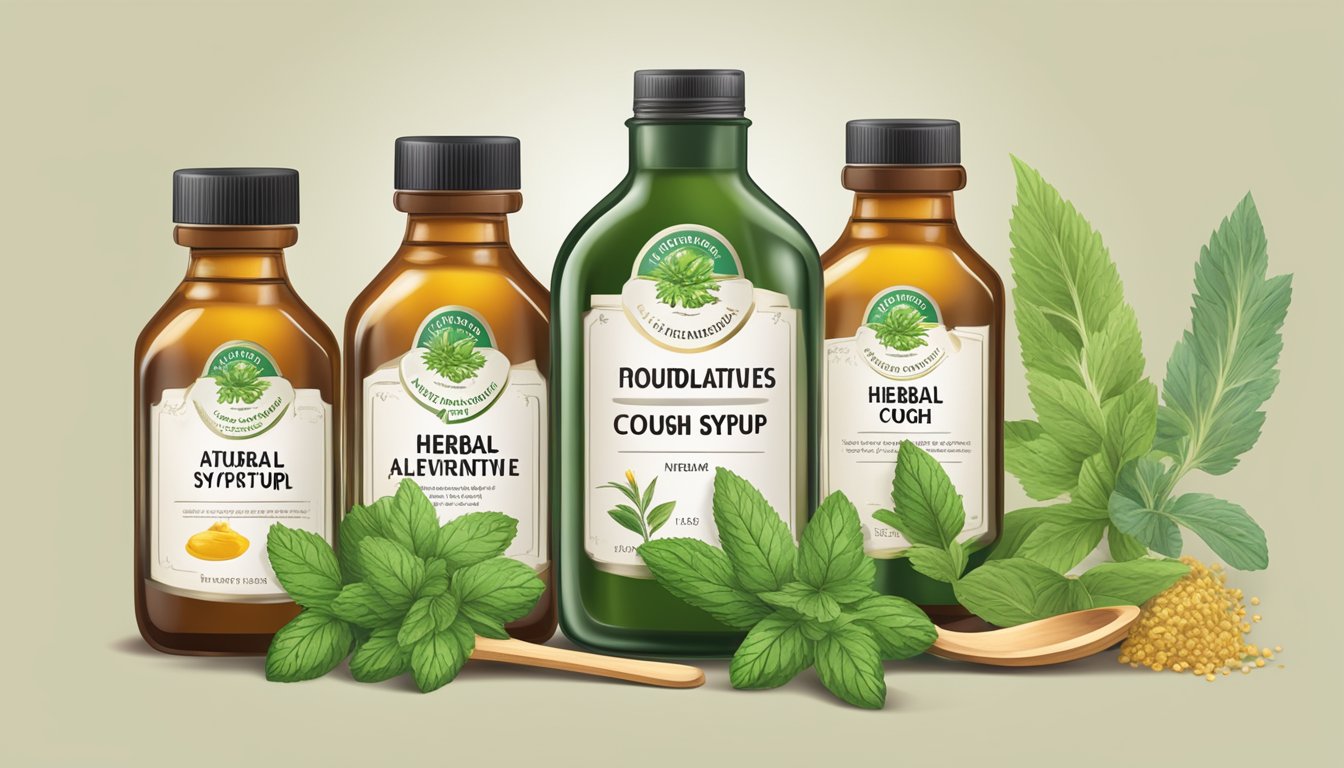
As someone who prefers natural remedies, I understand the appeal of herbal cough syrup. Not only can it provide relief from coughing, but it also has many other benefits. In this section, I will discuss the benefits of herbal cough syrup and the ingredients commonly used in it.
Benefits of Herbal Cough Syrup
One of the main benefits of herbal cough syrup is that it is a natural cough remedy. Instead of relying on synthetic medications, which can have unwanted side effects, herbal cough syrup uses natural ingredients to soothe the throat and suppress coughing.
Herbal cough syrup often contains demulcents, which are substances that soothe and protect irritated or inflamed tissue. Some common demulcents found in herbal cough syrup include marshmallow root, slippery elm, and licorice. These demulcents can help to coat the throat and reduce coughing.
Herbal cough syrup may also contain antioxidants, which can help to boost the immune system and fight off infections. Elderberry, for example, is a powerful antioxidant that has antiviral properties. Honey is another common ingredient in herbal cough syrup that has antioxidant and antibacterial properties.
Ingredients Commonly Used
Herbal cough syrup can contain a variety of ingredients, depending on the specific recipe. Some common ingredients include ginger, lemon, and volatile oils like eucalyptus and peppermint. These ingredients have antispasmodic and soothing properties that can help to reduce coughing and calm the throat.
Other common ingredients in herbal cough syrup include plantain, thyme, echinacea, and apple cider vinegar. Plantain is a demulcent that can help to soothe and protect the throat, while thyme has antiviral properties that can help to fight off infections. Echinacea is an immune system booster that can help to prevent colds and flu, and apple cider vinegar has antibacterial properties that can help to kill germs.
Finally, some herbal cough syrups contain cayenne pepper and turmeric, which have anti-inflammatory properties that can help to reduce inflammation in the throat and airways.
Overall, herbal cough syrup is a great natural alternative to synthetic cough medications. By using ingredients like honey, ginger, and lemon, herbal cough syrup can provide soothing relief from coughing and other cold symptoms, you can also use mullein tincture..
DIY Recipes for Herbal Cough Syrup
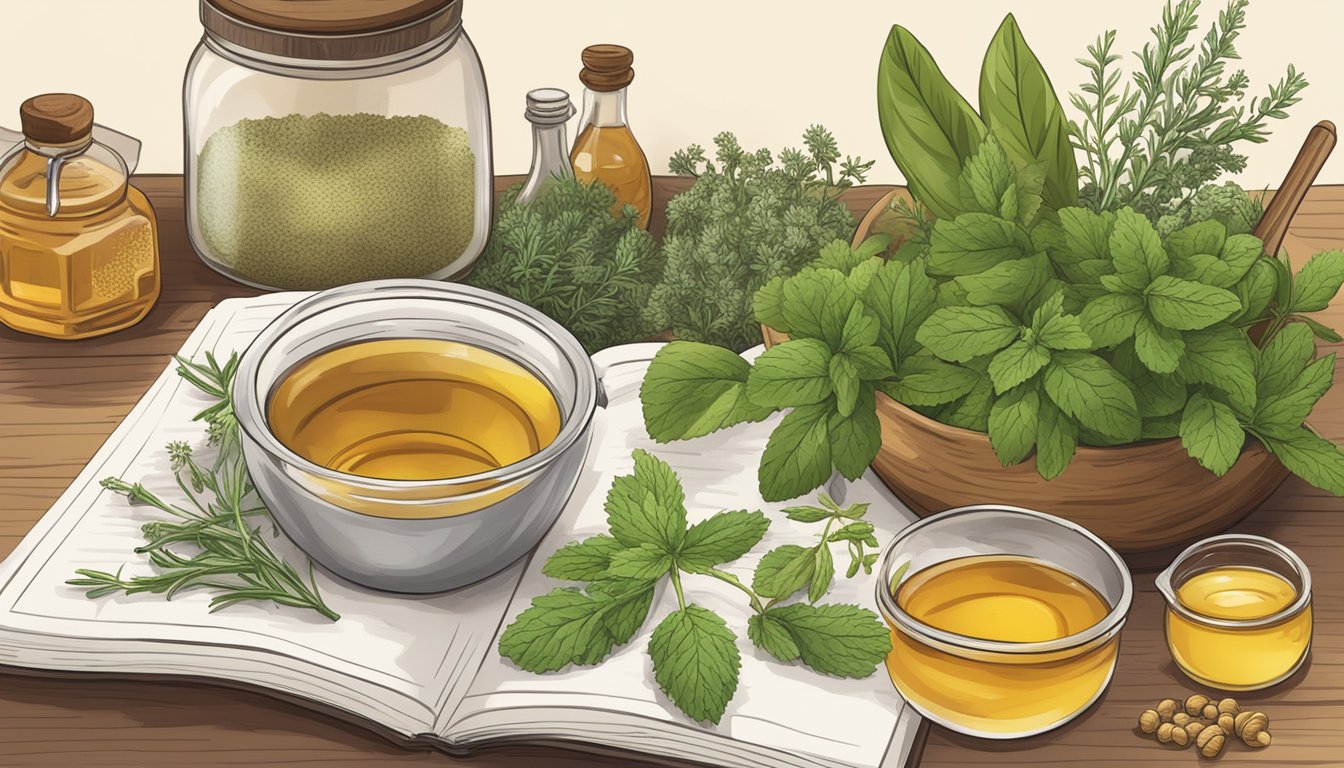
As someone who prefers natural remedies, I have tried and tested various DIY recipes for herbal cough syrup over the years. In this section, I will share some of my favorite recipes that have worked wonders for me.
Honey Cough Syrup Recipe
Honey is a natural cough suppressant and has been used for centuries to soothe sore throats. To make a simple honey cough syrup, mix 1/4 cup of honey with 2 tablespoons of lemon juice and 1/4 teaspoon of ginger powder. You can also add a pinch of cinnamon for flavor. Take 1-2 teaspoons of this syrup as needed to relieve cough and sore throat symptoms.
If you have access to local raw honey, even better! Raw honey contains pollen from local flowers and can help boost your immune system. However, keep in mind that honey should not be given to children under the age of one.
Homemade Cough Drops
If you prefer cough drops over syrup, you can make your own at home. Mix 1 cup of sugar with 1/2 cup of water and 1/4 teaspoon of cream of tartar in a saucepan. Heat the mixture over medium heat until it reaches 300°F (150°C) on a candy thermometer. Remove from heat and add 1/4 teaspoon of your favorite herbal infusion, such as chamomile or peppermint. Pour the mixture into candy molds or onto a greased surface and let it cool and harden. Pop out the cough drops and store them in an airtight container.
Wild Cherry Bark Cough Syrup
Wild cherry bark is a natural cough suppressant and can be found in health food stores or online. To make a wild cherry bark cough syrup, simmer 1/4 cup of dried wild cherry bark in 2 cups of water for 30 minutes. Strain the liquid and mix it with 1 cup of honey and 1/4 cup of apple cider vinegar. Store the syrup in the refrigerator and take 1-2 teaspoons as needed to relieve cough and sore throat symptoms. Keep in mind that this syrup has a shelf life of about a month, so make sure to use it up before it goes bad.
These are just a few of the many DIY recipes for herbal cough syrup out there. Remember to always do your research and consult with a healthcare professional if you have any concerns or underlying health conditions.
Tips for Preventing Coughs and Colds
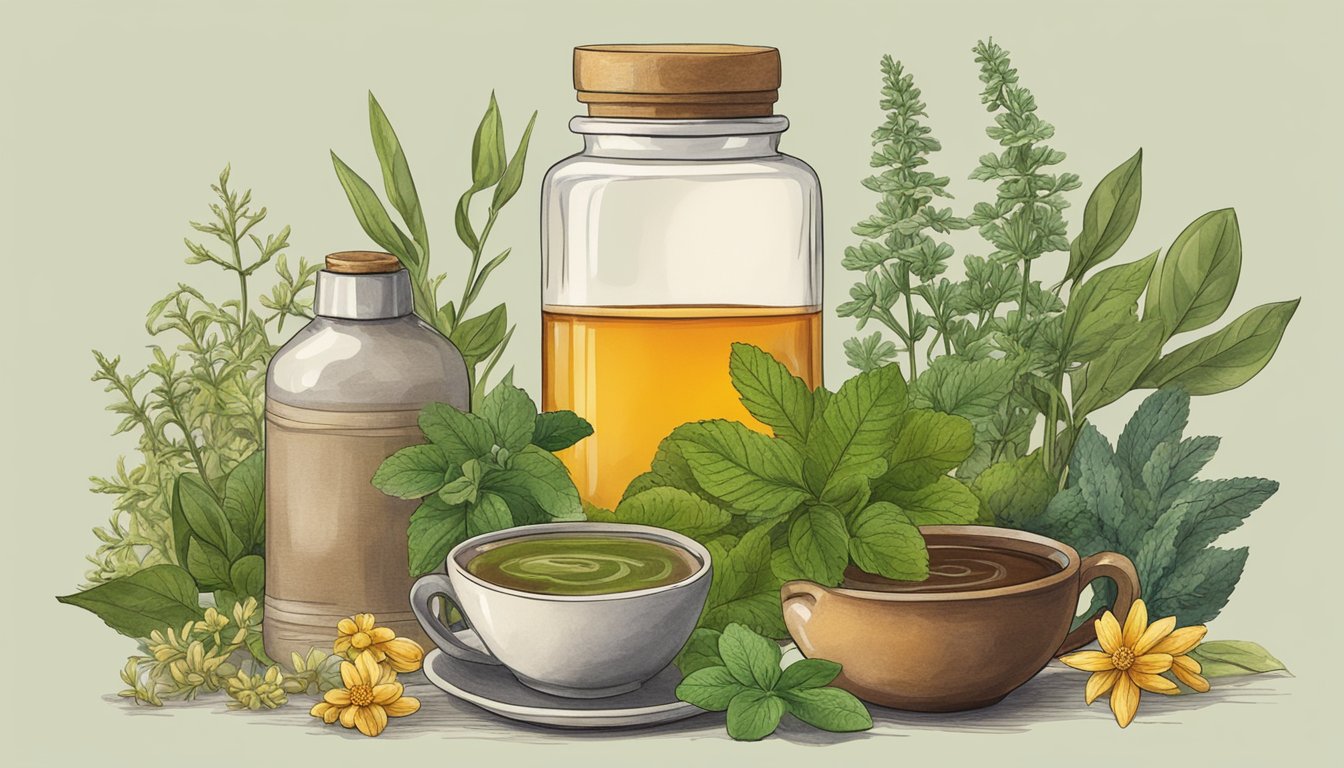
As someone who has dealt with coughs and colds before, I understand how frustrating it can be to constantly deal with these illnesses. Fortunately, there are several things you can do to help prevent getting sick. In this section, I will go over some tips for preventing coughs and colds.
Immune-Boosting Herbs
One of the best things you can do to prevent getting sick is to boost your immune system. There are several herbs that are known for their immune-boosting properties, such as echinacea, elderberry, and thyme. These herbs contain antioxidants and other nutrients that can help support your immune system and keep you healthy.
Habits for Maintaining Good Health
Maintaining good health is essential for preventing coughs and colds. This includes getting enough nutrition, staying hydrated, and getting enough rest. Eating a healthy diet that is rich in vitamin C and other nutrients can help support your immune system. Drinking plenty of water and other fluids can help keep your body hydrated, which is important for maintaining good health. Getting enough rest is also essential for keeping your immune system strong.
Knowing When to Seek Medical Advice
While most coughs and colds will go away on their own, it is important to know when to seek medical advice. If you have a persistent cough or other symptoms that last for more than a week, you should see a medical professional. This is especially important if you have high blood pressure or chronic respiratory conditions, as these conditions can make it harder for your body to fight off infections.
By following these tips, you can help prevent coughs and colds and keep yourself healthy during flu season.
Before You Go – Herbal Cough Syrup

After researching and analyzing various studies and articles on herbal cough syrup, I can confidently say that it can be a safe and effective treatment for reducing the symptoms of acute nonproductive cough and throat irritation. The studies show that herbal cough syrups such as Honitus Syrup, BNO 1200, and Corid-Cough Pearls can provide relief from cough severity, throat irritation, and improve quality of life.
The effectiveness of herbal cough syrup can be attributed to the natural ingredients used in their formulation, such as thyme, ivy, acacia catechu, myristica fragrans, piper cubeba, and punica granatum. These herbs have been traditionally used for their soothing and expectorant properties, making them an excellent choice for cough and cold symptoms.
It is important to note that herbal cough syrup should not be used as a substitute for medical advice or treatment. If cough symptoms persist for more than a week or are accompanied by other symptoms such as fever, chest pain, or difficulty breathing, it is recommended to consult a healthcare professional.
Overall, herbal cough syrup can be a safe and effective option for reducing cough symptoms and throat irritation. However, as with any medication, it is essential to follow the recommended dosage and seek medical advice if symptoms persist or worsen.
Herbal Healing: Herbal Cough Syrup and TheHerbProf
Let’s delve into the world of Herbal Cough Syrup and explore how it connects to our herbal home, theherbprof.com.
First off, this syrup is a marvel! It’s packed with herbal goodness, offering a unique healing experience while promoting health. Now, isn’t that something we all love at theherbprof.com? You can check our homepage here!
But wait, there’s more! By sharing information about Herbal Cough Syrup, we’re showing our commitment to exploring and promoting herbal wisdom. It’s like saying, “Hey, want to learn more about herbs? Come join us at theherbprof.com!”
References – Herbal Cough Syrup
Little Herb Encyclopedia, by Jack Ritchason; N.D., Woodland Publishing Incorporated, 1995
The Ultimate Healing System, Course Manual, Copyright 1985, Don Lepore
Planetary Herbology, Michael Tierra, C.A., N.D., Lotus Press, 1988
Handbook of Medicinal Herbs, by James A. Duke, Pub. CRP Second Edition 2007
The Complete Medicinal Herbal, by Penelope Ody, Published by Dorling Kindersley
Check the Following Articles!
White Willow Bark Reviews: Benefits & Side Effects
Is Herbal Care Rx Legit? An Unbiased Review
Home Remedies for Cold and Cough
Frequently Asked Questions – Herbal Cough Syrup
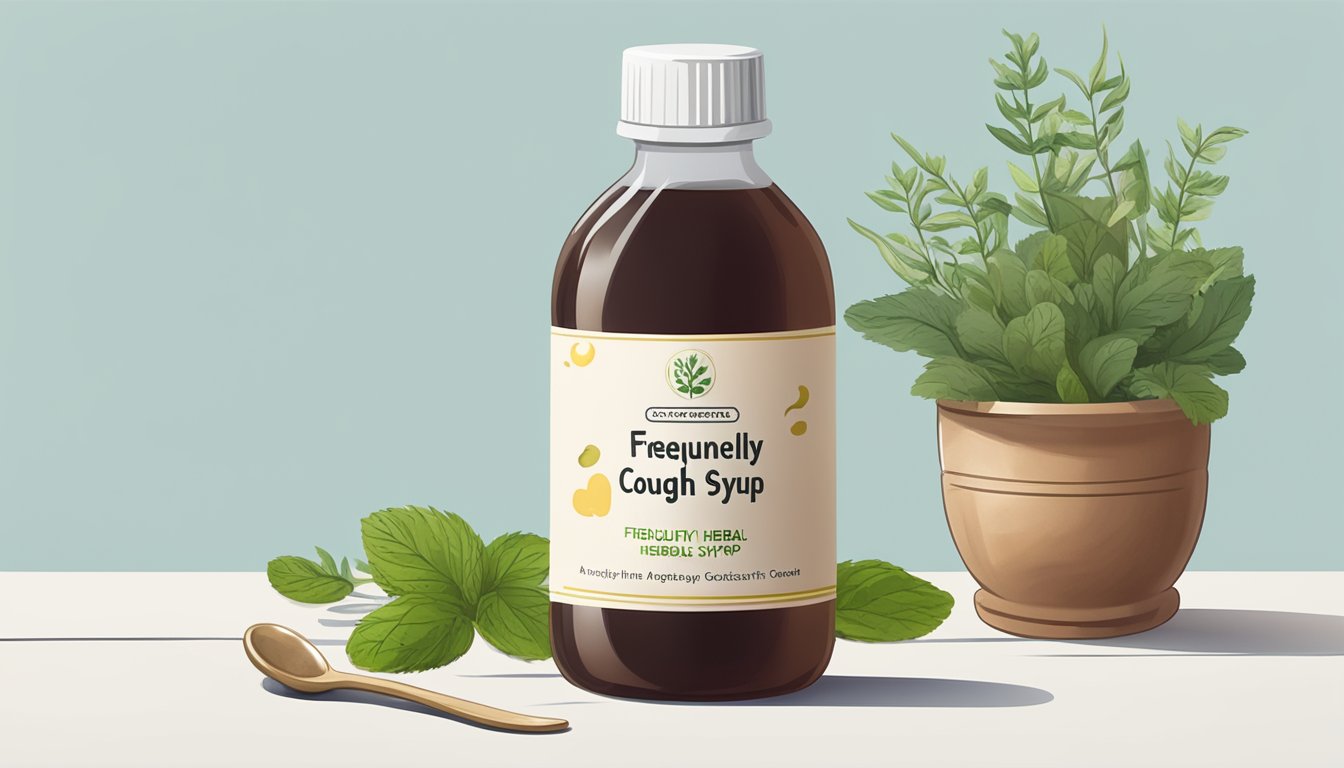
What natural ingredients are effective for treating a dry cough?
Natural ingredients that are effective for treating a dry cough include honey, ginger, lemon, and marshmallow root. Honey is a natural cough suppressant and has antimicrobial properties that can help fight off infections. Ginger has anti-inflammatory properties that can help soothe the throat and reduce coughing. Lemon is rich in vitamin C, which can boost the immune system and help fight off infections. Marshmallow root is a demulcent herb that can help soothe the throat and reduce inflammation.
Can you provide a homemade herbal syrup recipe for cough relief?
Yes, here’s a simple recipe for a homemade herbal syrup that can help relieve cough:
Ingredients:
- 1 cup of honey
- 1 cup of water
- 2 tablespoons of dried thyme
- 2 tablespoons of dried marshmallow root
Instructions:
- In a small saucepan, combine the honey and water.
- Add the dried thyme and marshmallow root to the saucepan.
- Bring the mixture to a boil, then reduce the heat and let it simmer for 20-30 minutes.
- Strain the mixture through a fine-mesh sieve or cheesecloth.
- Let the syrup cool before transferring it to a clean glass jar.
- Store the syrup in the refrigerator for up to three months.
Is there an herbal cough syrup suitable for babies?
It’s important to consult with a pediatrician before giving any herbal remedies to babies or young children. However, some natural remedies that may be safe for babies include honey, saline drops, and steam therapy. Honey should not be given to babies under one year old due to the risk of botulism.
What are the benefits of using marshmallow root in cough syrups?
Marshmallow root is a demulcent herb that can help soothe the throat and reduce inflammation. It contains mucilage, a sticky substance that can coat the throat and protect it from irritants. Marshmallow root can also help loosen mucus and promote coughing, which can help clear the airways.
Which herbs are traditionally used in Chinese medicine to alleviate cough symptoms?
Some herbs that are traditionally used in Chinese medicine to alleviate cough symptoms include licorice root, ginger, cinnamon, and fritillary bulb. Licorice root has anti-inflammatory properties and can help soothe the throat. Ginger and cinnamon have warming properties that can help reduce coughing and promote sweating. Fritillary bulb is a natural expectorant that can help loosen mucus and promote coughing.
Are there quick home remedies to alleviate coughing overnight?
Some quick home remedies to alleviate coughing overnight include drinking warm liquids, using a humidifier, elevating the head while sleeping, and using cough drops or throat lozenges. Drinking warm liquids can help soothe the throat and reduce coughing. Using a humidifier can add moisture to the air and help loosen mucus. Elevating the head while sleeping can help prevent mucus from pooling in the throat. Cough drops or throat lozenges can provide temporary relief from coughing. However, it’s important to consult with a healthcare professional if coughing persists or is accompanied by other symptoms.
